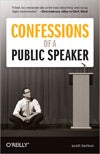Book Review: <em>Confessions of a Public Speaker </em>by Scott Berkun
Opinions expressed by Entrepreneur contributors are their own.
 Note:After blogging for Entrepreneur over at Top Shelf Reading Picks for a few years, we decided to add my reviews to the Daily Dose.So, I bid welcome to my new readers. Hope you find these useful and fun.
“What should I read next?”
Confessions of a Public Speaker
Note:After blogging for Entrepreneur over at Top Shelf Reading Picks for a few years, we decided to add my reviews to the Daily Dose.So, I bid welcome to my new readers. Hope you find these useful and fun.
“What should I read next?”
Confessions of a Public Speaker
Speakers often worry about the wrong things.
- Not having an interesting opinion
- Not thinking clearly about your points
- Not planning ways to make those points relevant to your audience
- Big rooms + small crowd? Take charge and move them all up front near you.They will be more engaged and more likely to focus.
- “Failing to own your turf is the big mistake that can create a tough crowd.”
- “Taking responsibility for the crowd means showing up to the room early enough to at least hear the previous speaker.” (It gives you time to read the audience.)
- If you have a tough crowd or are flailing, find the person who hates you the least, and focus on him or her.
- Take a strong position in the title (note to self: no more Social Media 101 titles …)
- Think carefully about your specific audience.
- Make your specific points as concise as possible.
- Know the likely counterarguments from an intelligent, expert audience.
Top Shelf Bottom Line. Confessions Confessions of a Public Speaker
 Note:After blogging for Entrepreneur over at Top Shelf Reading Picks for a few years, we decided to add my reviews to the Daily Dose.So, I bid welcome to my new readers. Hope you find these useful and fun.
“What should I read next?”
Confessions of a Public Speaker
Note:After blogging for Entrepreneur over at Top Shelf Reading Picks for a few years, we decided to add my reviews to the Daily Dose.So, I bid welcome to my new readers. Hope you find these useful and fun.
“What should I read next?”
Confessions of a Public Speaker
Speakers often worry about the wrong things.
- Not having an interesting opinion
- Not thinking clearly about your points
- Not planning ways to make those points relevant to your audience
- Big rooms + small crowd? Take charge and move them all up front near you.They will be more engaged and more likely to focus.
- “Failing to own your turf is the big mistake that can create a tough crowd.”
- “Taking responsibility for the crowd means showing up to the room early enough to at least hear the previous speaker.” (It gives you time to read the audience.)
- If you have a tough crowd or are flailing, find the person who hates you the least, and focus on him or her.
- Take a strong position in the title (note to self: no more Social Media 101 titles …)
- Think carefully about your specific audience.
- Make your specific points as concise as possible.
- Know the likely counterarguments from an intelligent, expert audience.
Top Shelf Bottom Line. Confessions Confessions of a Public Speaker





